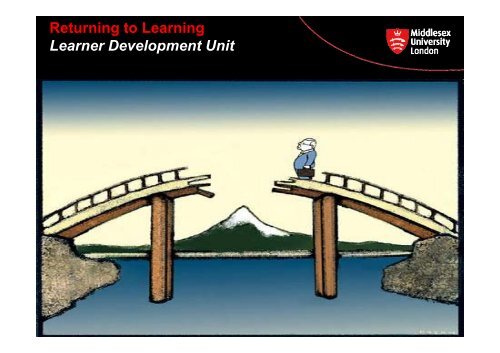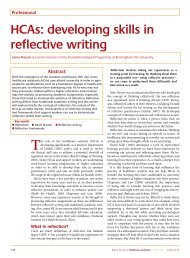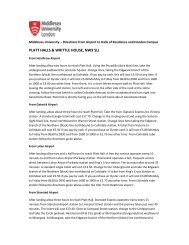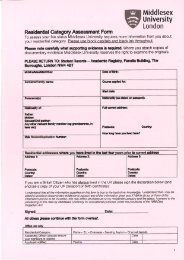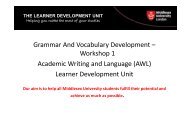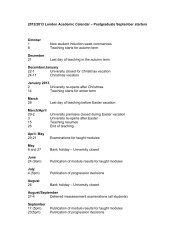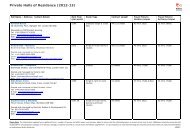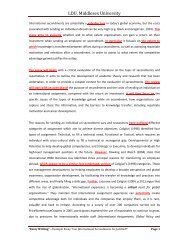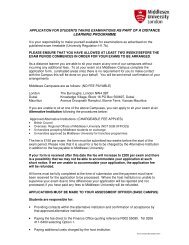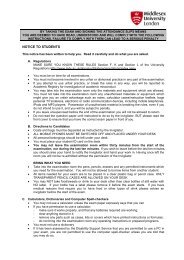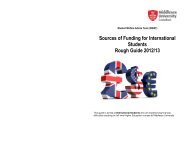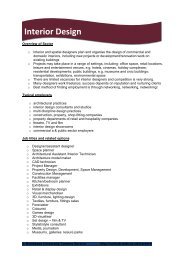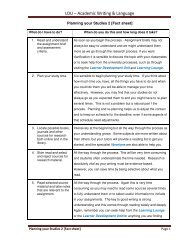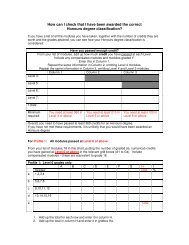Returning to Learning - UniHub - Middlesex University
Returning to Learning - UniHub - Middlesex University
Returning to Learning - UniHub - Middlesex University
You also want an ePaper? Increase the reach of your titles
YUMPU automatically turns print PDFs into web optimized ePapers that Google loves.
<strong>Returning</strong> <strong>to</strong> <strong>Learning</strong><br />
Learner Development Unit
Learner Development Unit<br />
• “Now what I want is facts. Teach these boys and girls<br />
nothing but Facts. Facts alone are wanted in life …<br />
nothing else will ever be of any service <strong>to</strong> them …<br />
Stick <strong>to</strong> facts …”<br />
(From a teacher called Mr Gradgrind in “Hard Times” by Dickens (1854: 1))<br />
• In 2012, what has changed?<br />
Slide 2<br />
30/10/12
Quotes on learning:<br />
I cannot teach anybody anything,<br />
I can only make them think – Socrates<br />
You cannot teach a man anything. You can only help him<br />
discover it within himself – Galileo Galilei<br />
I never teach my pupils; I only attempt <strong>to</strong> provide the<br />
conditions co d o s in which c they ey can ca learn ea – Albert be t Einstein ste<br />
Thinking itself is nothing but the process of asking and<br />
answering questions – Anthony Robbins<br />
One must learn by doing the thing; though you think you<br />
know it, it you have no certainty until you try – Sophocles<br />
Slide 3<br />
30/10/12
Quotes on learning:<br />
Slide 4<br />
30/10/12<br />
What I hear, I forget.<br />
What I see, see I remember. remember<br />
What I do, I understand.<br />
Kung Fu Tzu (Confucius)
<strong>Returning</strong> <strong>to</strong> learning!
Learner Development Unit<br />
<strong>Returning</strong> <strong>to</strong> learning!<br />
• <strong>Learning</strong>: school, college, university, life, workplace<br />
• Who really has the advantage?<br />
• Who seems <strong>to</strong> have the most confidence? Why?<br />
• What is learning?<br />
– Think of two things: you have learned well / badly<br />
– What made learning effective / not effective?
<strong>Returning</strong> <strong>to</strong> learning<br />
Did you report any of the following:<br />
‐ Motivation, emotion<br />
‐ Engagement , feeling immersed<br />
‐ Getting useful feedback<br />
‐ Making sense of ideas <strong>to</strong> absorb them<br />
‐ Attitudes –having a go, buckling down, investing<br />
time, repeating, being self‐aware<br />
‐ Knowing what what’s s expected of you!<br />
Slide 7<br />
30/10/12
<strong>Returning</strong> <strong>to</strong> learning<br />
Successful <strong>Learning</strong>:<br />
• <strong>Learning</strong> by doing – being active<br />
• <strong>Learning</strong> as a process<br />
• Taking ownership of it (being au<strong>to</strong>nomous)<br />
• Making sense of input – “getting getting your head<br />
round it”… “digesting”; engaging with feedback;<br />
di discussing i id ideas – QQuestioning ti i , reflecting fl ti<br />
• Wanting/needing g g<strong>to</strong> – engagement, gg motivation<br />
Slide 8<br />
30/10/12
Abstract<br />
Conceptualisation<br />
Slide from Phil Race<br />
http://phil‐race.co.uk [2011]<br />
Active<br />
Experimentation<br />
Reflective<br />
Ob Observation ti<br />
Concrete<br />
Experience
<strong>Returning</strong> <strong>to</strong> learning<br />
Therefore ‘learner responsibility’ is paramount:<br />
– IIndependence d d and d iinitiative iti ti t<strong>to</strong> solve l problems bl<br />
– Motivation, , self-discipline, p , time management g<br />
– Study groups with peers. Consider<br />
• The rich wisdom obtained from your work/career,<br />
• From your life experiences, your family and other<br />
relationships, and your pursuits.<br />
• The wisdom and expertise of your study group peers<br />
• The power of relationship-building and alliances or<br />
study groups with others returning <strong>to</strong> learning!
Form informal study groups<br />
Slide 11<br />
30/10/12
<strong>Returning</strong> <strong>to</strong> learning<br />
• Firstly, understand your own ‘intelligence’:<br />
– LLogical, i l spatial, ti l musical, i l emotional, ti l numerical i l …<br />
– Audio, , visual, , kinaesthetic, ,<br />
– Social, individual, global, analytic …<br />
• Reconfigure study habits <strong>to</strong> fit preferences<br />
Slide 12<br />
30/10/12
Learner Development Unit<br />
<strong>Returning</strong> <strong>to</strong> learning!<br />
• Find out what academic writing is:<br />
What is a report? Research report? Essay? Reflective writing?<br />
• Considered the differences?<br />
– In structure<br />
– In convention and format<br />
– In writing g style y<br />
– In content<br />
– In approach pp
Learner Development Unit<br />
<strong>Returning</strong> <strong>to</strong> learning!<br />
• Essays:<br />
– leading the reader from a nowhere place <strong>to</strong> a somewhere<br />
place – logical logical, flow<br />
– Supports a thesis statement, which is basis of conclusion<br />
• Reports:<br />
– efficiency of readability, simple/overview <strong>to</strong> complex/detail<br />
• RResearch hreport:<br />
– literature reviewing, method, results, discussion, limitations,<br />
conclusion l i<br />
• Reflective writing:<br />
– reporting situations and responses, analysing, assumptions,<br />
– alternative scenarios, future actions
Love your lap<strong>to</strong>p!<br />
Slide 15<br />
Master the art of <strong>to</strong>uch typing, editing, keyboard shortcuts, filing<br />
30/10/12
Learner Development Unit<br />
<strong>Returning</strong> <strong>to</strong> learning!<br />
Find out what referencing is:<br />
• Acknowledging sources, locatable sources<br />
• Shows you read widely<br />
• Substantiates claims, can distance claims <strong>to</strong>o<br />
• Plagiarism will fail you!<br />
• Be aware of academic voice<br />
• Academic discourse: a social process, spans time and space<br />
• Reflect this in your y writingg<br />
• Fluid paraphrasing: rich variety in reporting verbs
Reporting verbs<br />
“Smith claims …” ” YAWN!<br />
“Smith says …”<br />
(Smith 2007)<br />
Slide 17<br />
30/10/12
Reporting p g verbs: subtle meaningg<br />
admit d it agree postulate t l t assume bbelieve li claim l i<br />
imply py consider decide deny y<br />
determine discover<br />
doubt explain hypothesize oppose indicate infer<br />
maintain prove presume reveal highlight state<br />
observe note contend propose conclude assert<br />
challenge reveal refute outline indicate suggest<br />
point out support acknowledge examine concede recognise<br />
Slide 18<br />
30/10/12
Learner Development Unit<br />
<strong>Returning</strong> <strong>to</strong> learning!<br />
• Get comfortable f bl with ihtexts:<br />
Make sense of journal articles and papers<br />
Learn ‘word attack’ and ‘guessing from context’<br />
Learn <strong>to</strong> ‘survey’, ask, read, recall, review<br />
L Learn <strong>to</strong> ‘ ‘act curious’ i ’ <strong>to</strong> stimulate i l your iinterest<br />
• Meet a librarian! Love your library!<br />
Get online and see the library interface<br />
Join a library induction<br />
Opening hours, borrowing, copying<br />
Library catalogues<br />
Electronic direc<strong>to</strong>ries and e‐journals
Learner Development Unit<br />
<strong>Returning</strong> <strong>to</strong> learning!<br />
• Find out what help you can get:<br />
Learner Development Unit:<br />
Academic Writing and English Language Development (AWL),<br />
Maths, Stats & Numeracy Support (MSN), Dyslexia Support,<br />
Student <strong>Learning</strong> Assistants (SLAs), visit the <strong>Learning</strong> Lounge<br />
UniHelp online<br />
International Support<br />
Student Welfare Advice<br />
Disability Support<br />
• Give your y mind what it needs:<br />
Sleep, play, fun, decent food, sport and fitness, routine
Learner Development Unit<br />
<strong>Returning</strong> <strong>to</strong> learning!<br />
• Taking part: getting your voice heard ‐ early<br />
• LLeading di discussions: di i physical & intellectual control, steering<br />
• Developing p gp presentation skills<br />
• Teamwork skills<br />
• FForming i fi friendships: dhi<br />
– Alliances from diverse backgrounds<br />
– Fresh and rich perspectives<br />
– Support … but avoid freeloaders and cheats!
Aspects of Thinking …<br />
• Finding things out<br />
• Working things out<br />
• Deciding<br />
• Solving<br />
• JJustifying tif i<br />
• Remembering<br />
• Planningg<br />
• Arguing<br />
• Identifying<br />
• Speculating<br />
• Calculating<br />
• Comparing<br />
• Deducing<br />
• Predicting<br />
• Realising implications<br />
• Concluding<br />
• Presuming • Distinguishing<br />
• Analysing • Creating<br />
• SSummarising i i • TTesting ti<br />
• Hypothesising • Assessing<br />
• Evaluatingg<br />
• Linking g ideas<br />
• Sequencing<br />
• Ordering<br />
• Sorting<br />
• Classifying<br />
• Grouping<br />
(Adapted from McGuinness, 1999)<br />
McGuinness, C. (1999). From<br />
Thinking Skills <strong>to</strong> Thinking<br />
Classrooms: A Review and<br />
Evaluation of Approaches for<br />
Developing Pupils' Thinking.<br />
Nottingham: DfEE Publications.
Aspects of Thinking …<br />
• Finding things out<br />
• Working things out<br />
• Deciding<br />
• Solving<br />
• Justifying<br />
• Remembering<br />
• Planning<br />
• Arguing<br />
• Identifying<br />
• Speculating<br />
• Calculating<br />
• Comparing<br />
• Deducing<br />
• Predicting<br />
• Realising implications • Concluding<br />
• Presuming • Distinguishing<br />
• Analysing • Creating<br />
• Summarising • Testing<br />
• Hypothesising • Assessing<br />
• Evaluating • Linking ideas<br />
• Sequencing<br />
• Ordering<br />
• Sorting<br />
• Classifying<br />
• Grouping<br />
(Ad (Adapted d ffrom MGi McGuinness, 1999)<br />
McGuinness, C. (1999). From<br />
Thinking Skills <strong>to</strong> Thinking<br />
Classrooms: A Review and<br />
Evaluation of f Approaches pp for f<br />
Developing Pupils' Thinking.<br />
Nottingham: DfEE Publications.<br />
Reflect on your work/career, life experiences, your family and other relationships,<br />
your pursuits: how many of the above have you used extensively already?
Testing your awareness<br />
• Your main sources of information are lectures lectures. True or false?<br />
False! Seminars, workshops, tu<strong>to</strong>rials, online learning, and personal research<br />
through reading. The lecture is a basic ‘springboard’ in<strong>to</strong> all these.<br />
• You get individual attention in a (group) tu<strong>to</strong>rial. True or false?<br />
True, although the extent may vary.<br />
• MMost tllearning i on a course comes through th h reading. di True T or false? fl ?<br />
True, especially the further you get through university.<br />
• Seminars involve one person presenting and then leading a group<br />
discussion on the <strong>to</strong>pic. p True or false?<br />
True
Extra tips<br />
• Meet and show commitment <strong>to</strong> your lecturers<br />
Enthusiastic about ideas<br />
Solution‐focussed<br />
Curious<br />
Comfortable with disagreement (it’s academic)<br />
• Identify & keep in mind your learning outcomes<br />
• Find past assignment and exam papers<br />
Slide 25<br />
30/10/12
Learner Development Unit<br />
<strong>Returning</strong> <strong>to</strong> learning!<br />
• Consider:<br />
External examiners check everything<br />
Your lecturers are trained educa<strong>to</strong>rs and subject experts<br />
BUT, you also learn from sharing of knowledge and<br />
experience among peers<br />
• Consider:<br />
There are no short‐cuts<br />
You (and only you) are in charge of your progress
Levels in HE<br />
Slide 27<br />
Level Zero: <strong>Learning</strong> at this level will reflect the ability <strong>to</strong>:<br />
apply knowledge and skills in a range of complex<br />
activities demonstrating comprehension of relevant<br />
theories; access and analyse information independently<br />
and make reasoned judgements, selecting from a<br />
considerable choice of procedures, in familiar and<br />
unfamiliar contexts; and direct own activities, with some<br />
responsibility for the output of others.<br />
30/10/12
Levels in HE<br />
• Level One: <strong>Learning</strong> at this level will reflect the ability <strong>to</strong>:<br />
develop a rigorous approach <strong>to</strong> the acquisition of a<br />
broad knowledge base; employ a range of specialised<br />
skills; evaluate information using it <strong>to</strong> plan and develop<br />
investigative strategies and <strong>to</strong> determine solutions <strong>to</strong> a<br />
variety of unpredictable problems; and operate in a<br />
range of varied and specific contexts, taking<br />
responsibility for the nature and quality of outputs.<br />
• (plus level zero)<br />
Slide 28<br />
30/10/12
Levels in HE<br />
• Level Two: <strong>Learning</strong> at this level will reflect the ability <strong>to</strong><br />
generate ideas through the analysis of abstracts<br />
concepts, with a command of specialised skills and the<br />
formulation of responses <strong>to</strong> well defined and abstract<br />
problems; analyse and evaluate information; exercise<br />
significant judgement across a broad range of functions;<br />
and accept responsibility for determining and achieving<br />
personal and group outcomes.<br />
• (as well as previous levels)<br />
Slide 29<br />
30/10/12
Levels in HE<br />
• Level Three: <strong>Learning</strong> at this level will reflect the ability<br />
<strong>to</strong> critically review, consolidate and extend a systematic<br />
and coherent body of knowledge, utilising specialised<br />
skills across an area of study; critically evaluate new<br />
concepts and evidence from a range of sources; transfer<br />
and apply diagnostic and creative skills and exercise<br />
significant judgement in a range of situations; accept<br />
accountability for determining and achieving personal<br />
and/or / group outcomes.<br />
• (plus all previous levels)<br />
Slide 30<br />
30/10/12
Levels in HE<br />
• Level Four: <strong>Learning</strong> at this level will reflect the ability <strong>to</strong><br />
display mastery of a complex and specialised area of<br />
knowledge and skills, employing advanced skills <strong>to</strong><br />
conduct research, or advanced technical or professional<br />
activity, accepting accountability for related decision‐<br />
making including use of supervision.<br />
• (plus previous levels)<br />
Slide 31<br />
30/10/12
The Mdx 20-point scale<br />
• To grade d you on your assignments, <strong>Middlesex</strong> ddl <strong>University</strong> uses a 20‐point scale, l<br />
where the higher the number the higher your success. True or false?<br />
• Scoring g 1‐4 on the scale is the very y highest g and means yyour understanding g is<br />
wide and relevant, you are self‐reflective, your thinking is abstract and original,<br />
you can generalise from what you find out and make great deductions. 5‐8 is<br />
very good indeed. indeed 99‐12 12 is quite good good. True or false?<br />
• Scoring 13‐16 on the scale means your knowledge is adequate but very basic,<br />
you get the main point but that’s all, you can’t generalise so well, and you<br />
perhaps h jjust ddealt l with ihone aspect iinstead dof f many. TTrue or fl false? ?<br />
• Scoring 17‐20 on the scale means you have failed because you have missed the<br />
point, p , lack the knowledge g needed, , or just j repeat p the same simple p thing g in<br />
different ways. True or false?<br />
Slide 32<br />
30/10/12
The Mdx 20-point scale<br />
Grade Class of Honours Degree Other Qualification<br />
1, 2, 3, 4 FIRST DISTINCTION<br />
55, 66, 77, 8 UPPER SECOND MERIT<br />
9, 10, 11, 12 LOWER SECOND PASS<br />
13, 14, 15, 16 THIRD PASS<br />
17<br />
FAIL ‐ MARGINAL FAIL ‐ MARGINAL<br />
Compensation allowed Compensation allowed<br />
18<br />
19<br />
20<br />
Slide 33<br />
30/10/12<br />
FAIL<br />
Compensation allowed<br />
FAIL<br />
FAIL<br />
Compensation not allowed<br />
FAIL<br />
Compensation allowed<br />
Compensation not allowed<br />
FAIL ‐ Incorporating failure <strong>to</strong> participate in FAIL ‐ Incorporating failure <strong>to</strong> participate in<br />
assessment necessary <strong>to</strong> achieve all learning<br />
outcomes. Compensation not allowed.<br />
assessment necessary <strong>to</strong> achieve all learning<br />
outcomes. Compensation not allowed.
More details<br />
Go <strong>to</strong> ‘My Study’ in <strong>UniHub</strong><br />
Slide 34<br />
30/10/12
Learner Development Unit<br />
<strong>Returning</strong> <strong>to</strong> learning!<br />
• Greatest boost:<br />
– Frame study as fun!<br />
• Greatest danger:<br />
– Procrastination!<br />
• Learner Development Unit:<br />
– Come see us!


